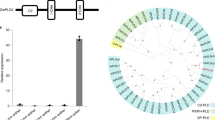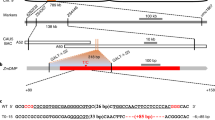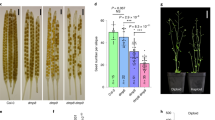Abstract
Intraspecific haploid induction in maize (Zea mays) is triggered by a native frameshift mutation in MATRILINEAL (MATL), which encodes a pollen-specific phospholipase. To develop a haploid inducer in rice (Oryza sativa), we generated an allelic series in the putative ZmMATL orthologue, OsMATL, and found that knockout mutations led to a reduced seed set and a 2–6% haploid induction rate. This demonstrates MATL functional conservation and represents a major advance for rice breeding.
This is a preview of subscription content, access via your institution
Access options
Access Nature and 54 other Nature Portfolio journals
Get Nature+, our best-value online-access subscription
$29.99 / 30 days
cancel any time
Subscribe to this journal
Receive 12 digital issues and online access to articles
$119.00 per year
only $9.92 per issue
Buy this article
- Purchase on Springer Link
- Instant access to full article PDF
Prices may be subject to local taxes which are calculated during checkout


Similar content being viewed by others
References
Chang, M.-T. & Coe, E. in Molecular Genetics Approaches to Maize Improvement (eds Kriz, A. L. & Larkins, B. A.) 127–142 (Springer, Heidelberg, 2009).
Wędzony, M. et al. in Advances in Haploid Production in Higher Plants (eds Touraev, A. et al.) 1–33 (Springer, Dordrecht, 2009).
Seguí-Simarro, J. M. & Nuez, F. J. Exp. Bot. 58, 1119–1132 (2007).
Premvaranon, P., Vearasilp, S., Thanapornpoonpong, S., Karladee, D. & Gorinstein, S. Biologia 66, 1074–1081 (2011).
Ozkara, A. & Savaskan, C. Res. J. Biotechnol. 9, 32–37 (2014).
Coe, E. H. Am. Nat. 93, 381–382 (1959).
Ravi, M. & Chan, S. W. L. Nature 464, 615–618 (2010).
Prigge, V. et al. Genetics 190, 781–793 (2012).
Kelliher, T. et al. Nature 542, 105–109 (2017).
Gilles, L. M. et al. EMBO J. 36, 707–717 (2017).
Liu, C. et al. Mol. Plant 10, 520–522 (2017).
Singh, A. et al. PLoS ONE 7, e30947 (2012).
Abiko, M. et al. PLoS ONE 8, e69578 (2013).
Colbert, T. et al. Plant Physiol. 126, 480–484 (2001).
Cong, L. et al. Science 339, 819–823 (2013).
Jinek, M. et al. Science 337, 816–821 (2012).
Wang, Y. et al. Plant Cell Rep. 36, 1333–1343 (2017).
Li, X. et al. Nat. Commun. 8, 991 (2017).
Chung, G. S. in Anther Culture for Rice Breeders (eds Zheng, K. & Murashige, T.) 8–37 (Seminar and Training for Rice Anther Culture, Hangzhou, 1992).
Mali, P. et al. Science 339, 823–826 (2013).
Gui, H., Li, X., Liu, Y. & Li, X. Plant Cell Rep. 33, 1081–1090 (2014).
Ingham, D. J., Beer, S., Money, S. & Hansen, G. Biotechniques 31, 132–140 (2001).
Acknowledgements
We thank D. Starr for work on the maize TILLING lines. We also thank X. Zhang, X. Chen, X. Li, J. Xu, K. White, R. Quadt and B. Zhang for leadership and project guidance and laboratory and greenhouse support. We thank J. Green for syntenic alignment and C. Leming for intellectual property guidance. We also thank H. Gandhi, Q. Que, N. Juba, G. Hu, B. Link, W. Cao, C. Kramer and C. Li for guidance.
Author information
Authors and Affiliations
Contributions
L.Y. managed the laboratory work and performed plant sequence and editing allele analysis. Y.Z. managed the greenhouse activities, including donor and E0 growth, and E0 and E1 phenotyping. C.L. performed the vector design and construction. Y.L. and Y.W. performed the rice transformation and event analysis. D.L. provided greenhouse and phenotyping support as well as laboratory support. J.L. led the later stages of the project and helped to organize and compose the manuscript draft. G.S. provided doubled haploid production advice and tested the HIR and seed set of rice TILLING lines. T.K. managed the maize TILLING allele analysis and provided overall project guidance and support, and edited the manuscript.
Corresponding author
Ethics declarations
Competing interests
A patent covering the information in this manuscript was submitted on 18 November 2016.
Additional information
Publisher’s note: Springer Nature remains neutral with regard to jurisdictional claims in published maps and institutional affiliations.
Supplementary information
Supplementary Information
Supplementary Figures 1 and 2, and Supplementary Tables 1–3
Rights and permissions
About this article
Cite this article
Yao, L., Zhang, Y., Liu, C. et al. OsMATL mutation induces haploid seed formation in indica rice. Nature Plants 4, 530–533 (2018). https://doi.org/10.1038/s41477-018-0193-y
Received:
Accepted:
Published:
Issue Date:
DOI: https://doi.org/10.1038/s41477-018-0193-y



